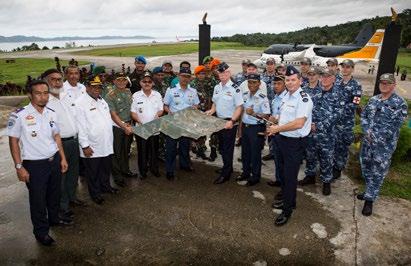
42 minute read
Catalina Recovery Mission MaryAnne Whiting
Catalina Recovery Mission
BY WING COMMANDER (DR) MARYANNE WHITING
Advertisement
On September 2nd, 1943, No 11 Squadron Catalina, A-2450, failed to return from a mine laying sortie to Sorong, in then Dutch New Guinea, and was reported missing with a crew of 10. Searches carried out along the route the aircraft was to have taken proved negative, and there was speculation the aircraft might have come down in the sea.
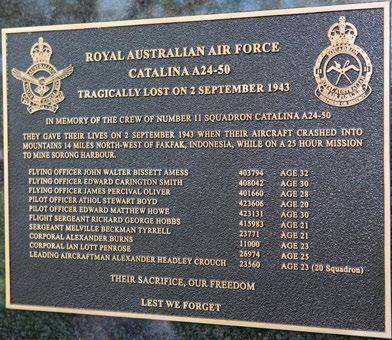
RIGHT: Cairns Catalina Memorial maintained by the Cairns Regional Council and the Cairns RAAF Association. ABOVE: The commemorative plaque unveiled on the 18 Jul 21 by the Chief of Air Force, Air Marshal Mel Hupfeld and Mr David Oliver representing the families of the aircrew of Catalina A24-50. Photo by WOFF Ian Gosper. Director-General History and Heritage - Air Force, Air Commodore John Meier and Chief of Staff Air Force Operations Command in Biak, Marsma Erwin Buana Kaskoopsau III (centre front) hold a piece tail wreckage from Catalina Flying Boat A24-50 which was salvaged during Operation Catalina Recovery. Photo by CPL David Said.
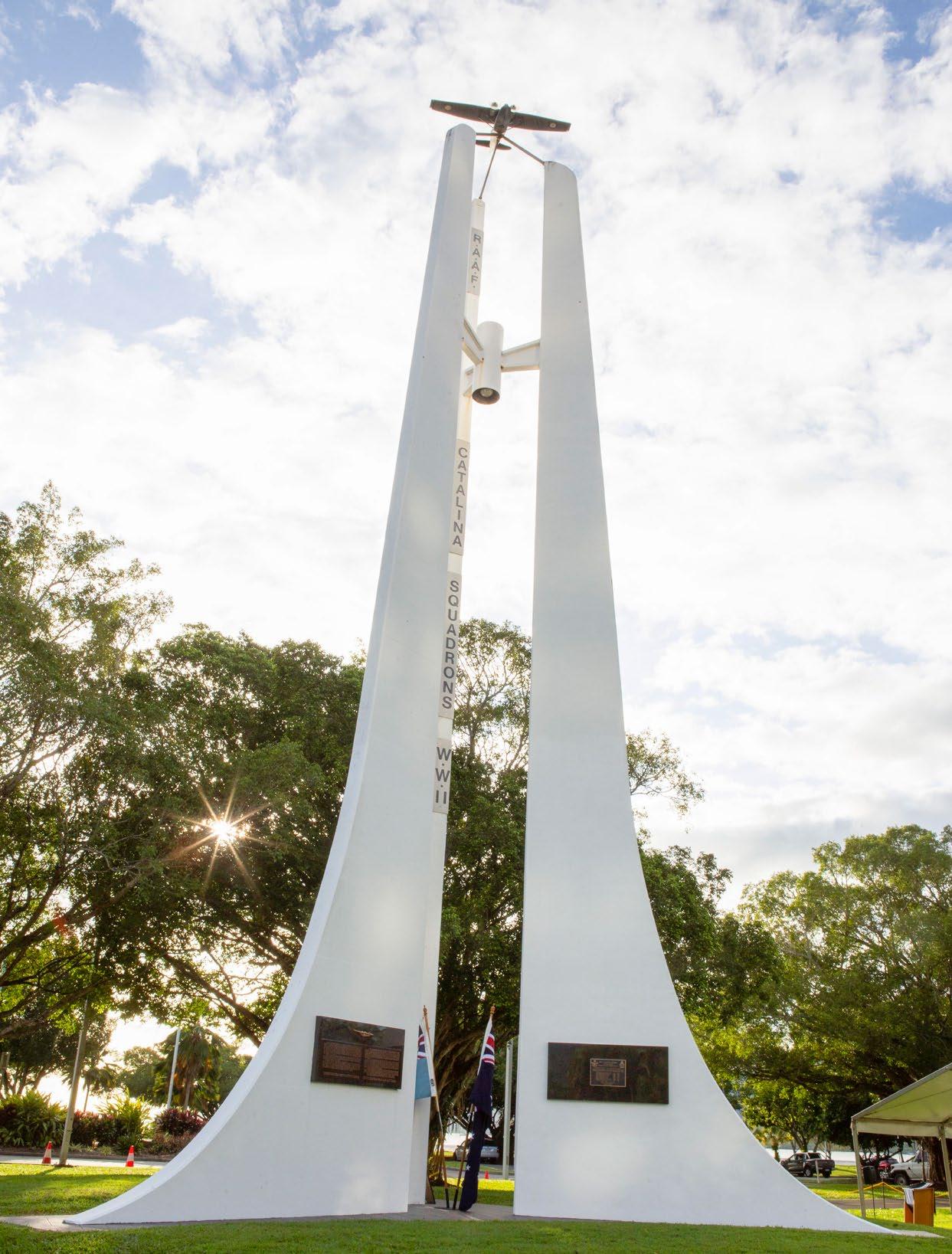
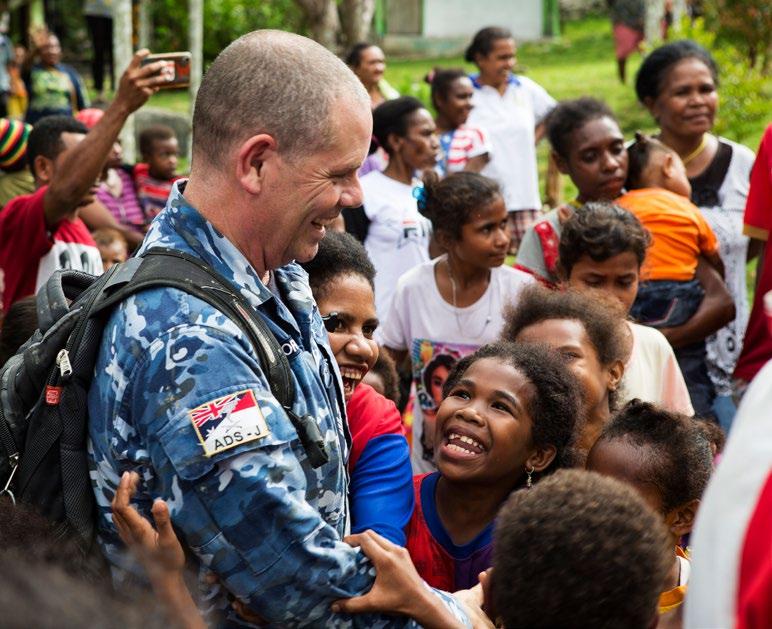
ABOVE: No 11 Squadron aircraft technician, Leading Aircraftman David Singleton views the wreckage of Catalina A24-50 during Operation Catalina Recovery in Indonesia. Photo by CPL David Said. LEFT: Former Air Force Assistant Attaché in Jakarta, Flight Sergeant Mark Harvey is swarmed by locals farewelling him from their village after a visit to receive a blessing for the recovery of Catalina A24-50. Photo by CPL David Said.
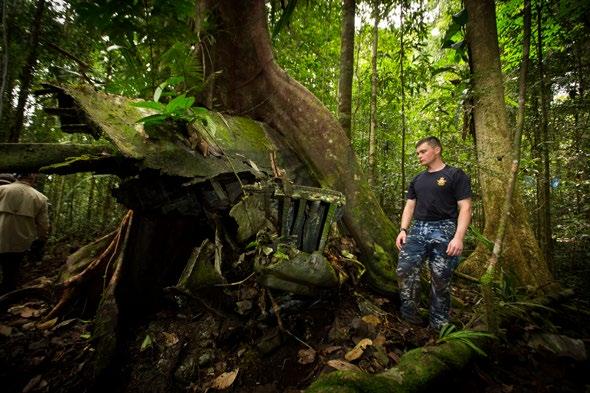
However, in 2018, local people from the Fakfak region of Papua, Indonesia located a wreck at an elevation of 460 meters on top of a small mountain in rainforest. In April 2019, a joint RAAF/TNI-AU (Indonesian Air Force) reconnaissance mission to the site positively identified the wreckage as RAAF Catalina A24-50. The then Deputy Director, Wing Commander Greg Williams, OAM and his Deputy, Wing Commander Grant Kelly (the current Deputy Director) from the Air Force Historic Unrecovered War Causalities, History and Heritage Branch, put together a team to locate and recover any remains of the 10 crew. The team included forensic dentist, Squadron Leader Alistair Soon, and Archaeologist, Squadron Leader Ash Matic; explosive ordnance disposal and removal experts, Flight Sergeant Luke Troy and Leading Aircraftman Zachary Anderson; Medic, Leading Aircraftman Matthew Parker, and Imagery Specialists, Sergeant David Gibbs and Corporal David Said. Leading Aircraftman David Singleton represented No 11 Squadron. Mr Nick Fletcher from the Australian War Memorial accompanied the team. The team assembled in RAAF Base Amberley and left on July 14th, 2019, on No 35 Squadron, C-27 aircraft captained by Flight Lieutenant Adam Darcy, stopping off at Darwin. The next day, the team travelled to Ambon, where senior TNI-AU representative, Lieutenant Colonel Usriyanto, and Flight Sergeant Mark Harvey, then the Assistant Air Force Advisor Jakarta who provided in-county support and acted as interpreter, met the team, before flying on to Fakfak and joining TNI-AU Special Forces and Army personnel. A reconnaissance task to the crash site was conducted on July 16. The terrain and conditions required a compressed recovery task over the following days. Wing Commander Williams said: The only major recognisable pieces of wreckage were two sections of the wing, engines and propeller, and the empennage [the rear part of fuselage] across the top of a ridge. He went on to say: One section of the wing ended up on the northern face of the ridge. The remainder of debris, including one propeller, is spread across the southern face of this ridge. The southern face is characterised by large rocks, with debris spread across a 10-meter square area. The southern slope and the top of the ridge was cleared of debris and rocks and searched where practical. A number of small artefacts were found; however, further investigative work is still required in order to confirm the origin of each item. We are very grateful for the excellent support we received from the Assistant Air Force Advisor Jakarta and particularly the TNI-AU personnel who accompanied us on the mission, and the local people of Fakfak who were generous in their hospitality and support. After 14 days in Fakfak, the team returned home on No 37 Squadron C-130J aircraft captained by Flight Lieutenant Andrew Morgan. The crew of A24-50:
FLGOFF James Percival Pilot and Captain of A24-50 FLGOFF Edward Carrington-Smith 2nd Pilot FLGOFF John Walter Bissett Amess 3rd Pilot PLTOFF Edward Matthew Howe Navigator PLTOFF Athol Steward Boyd Wireless Operator Air Gunner FSGT Richard George Hobbs Wireless Operator Air Gunner SGT Melville Bickman Tyrrell Armourer (Air Gunner) CPL Alexander Burns Fitter/Air Gunner CPL Ian Lott Penrose Fitter/Air Gunner LAC Alexander Headley Crouch Fitter/Air Gunner – No 20 Squadron
Prior to the recovery mission, the families of all the crew of Catalina A24-50 were contacted and advised about the recovery mission. WGCDR Whiting said, Air Force History and Heritage Branch very much appreciate the assistance provided by Marg O’Leary and Royce Atkinson from the Fromelles Association who traced and located the families, all of whom expressed their gratitude for the work carried out by the Air Force Historic Unrecovered War Causalities.
RSL – Steeped in History, Even More Relevant Today
The history of Returned & Services League of Australia (RSL) dates back for well over a century and the organisation is perhaps even more relevant today than when it was established at the height of the Great War. The RSL was founded in 1916 to address the lack of organised repatriation facilities and medical services available to those returning from service in the First World War. Today, this remains our motivating force, but we are working hard to modernise our organisation to ensure that it is well-resourced and available to assist all veterans and their families. Our core mission has never changed but has continued to evolve to meet the needs of each generation of servicemen and women and their families, as well as the promotion of a secure, stable, and progressive Australia. Current issues like the pending Royal Commission into Veteran and Defence Personnel Suicide, the alleged war crimes in Afghanistan and most recently the collapse of the Government in Afghanistan, the evacuation of Afghan nationals who assisted the Australian mission and the impact on veterans who served in that theatre are being addressed and assistance provided. The RSL is acutely aware that our Afghan veterans will be dismayed by recent events in that country and must be assured that their effort and sacrifice is appreciated by Australia and was not in vain. Yes, the RSL’s traditional roles of veteran welfare, advocacy and commemoration continue, while new roles have been implemented and evolved such as the recently announced national program of mental health support and training courses for veterans and their families. RSL Australia will be working with Open Arms over the next year to deliver Mental Health Literacy workshops across the country to the veteran community. The RSL Veterans Employment Program is another new key initiative, to provide veterans and their families improved options for employment opportunities, including resumes, counselling and employment placement assistance. With a membership of approximately 150,000, supported by 3700 Women’s Auxiliary members, all managed through State Branches and some 1154 Sub-Branches, the RSL is the oldest, largest and most representative ex-service organisation in Australia. Since its origins, the League has had a particular concern for the welfare of veterans, widows, and their dependants. This includes practical support to those in need, the management of aged-care facilities, and programs and the promotion of commemorative activities across the community. The RSL plays an important role in providing the Australian Government, through the Departments of Veterans Affairs and Defence, with a direct line of consultation with the veteran and serving communities in both the setting up and reviewing of policies and practices impacting on our community. The RSL provides input to Government inquiries and reviews. Over the past few years, we have provided submissions to important reviews and inquiries on military superannuation, injury compensation and rehabilitation, disability pensions and recognition of families and members of the Australian Defence Forces, injured, wounded, or killed while serving. Currently, we are preparing input to the review by the independent Defence Honours and Awards Appeals Tribunal of unit recognition for Australian Defence Force personnel who served in the Somalia conflict. Our deep concern at the incidence of suicide, attempted suicide and the mental health issues confronting veterans is well known. This is a very real and present problem that must be resolved. For this reason, the RSL has been prominent in its representations to Government in the development of terms of reference for the forthcoming Royal Commission and will be presenting a detailed submission to hearings when they get underway. Our submission will represent the voices of all RSL members, veterans and their families and we are ready to provide all possible assistance during the operation of the Commission We are also encouraging and will assist veterans to make individual submissions and representation to the Royal Commission, as well as providing access to mental health support, counselling, and further assistance both during and after the Commission hearings and outcome. The Royal Commission provides the opportunity to determine all the factors contributing to the poor mental health experience of veterans and the alarming incidence of suicide and attempted suicide. It provides a clear pathway for better outcomes for our veteran community in the future. The RSL is committed to providing whatever support necessary to find solutions that deal with this crucial issue which impacts severely on the entire veteran community. Importantly, through all our representations and activities, the RSL is apolitical, but we do work to ensure that governments meet their obligations, to veterans, defence personnel and the broader Australian community. Our State Branches and National Office engage with governments at all levels to enhance support and remove inequities for all veterans. Recognising there will always be limits on what is possible, we seek fairness and greater support for those in need. RSL plays an important role on behalf of veterans, giving a voice to government on national security and other issues of the day on behalf of veterans. We actively promote our policies on national issues, particularly the defence of Australia, conditions of service of serving members of the Australian Defence Forces and the development of a national defence infrastructure and defence industry. The RSL has a strong and committed membership spread throughout the length and breadth of Australia. As an organisation, we work hard to ensure that our members’ needs, and expectations are met and that we all share a strong sense of belonging and pride in our service and involvement in the RSL. For well over 100 years, the RSL has served its members, our nation’s veterans and their families and strongly supported the defence and wellbeing of Australia. The needs may have changed, our role and responsibilities evolved, and our approach modernised and expanded, but our commitment to the veteran community is unbroken and our resolve to serve stronger than ever. At its heart, the RSL is a service organisation. Our future remains in the hands of our committed members and the effective contribution we all make. Lest we forget.

MAJOR GENERAL (RETD) GREG MELICK AO, RFD, FANZCN, SC
National President Returned & Services League of Australia


Did you know... Veterans now have a National Provider of DVA Household Services, at no cost to you?
Could you be entitled?
Many Veterans, including younger Veterans, have service injuries making it impossible to stay on top of household chores. Whether from shoulders, backs and knees cruelled in the line of duty, to the constant spectre of anxiety and depression, registering your condition with DVA is the most important part. Under the Medical Rehabilitation Compensation Act (MRCA) and the Safety, Rehabilitation and Compensation Act – Defence (DRCA), the Department can then approve those services required for the proper running and maintenance of your household. This includes domestic cleaning, mowing and gardening, gutter, window and solar panel cleaning, laundry, meal preparation, dog walking and more. With the help of your GP, medical information and evidence regarding the practical implications of your condition should be detailed in your Claim Form to help DVA make a positive determination about your eligibility. Once your entitlement is approved via a Determination letter from DVA, HomeFront Did you kn Australia steps in to take care of your service delivery quickly, easily, and without hassle, ow... Australia now has a National Provider of Veteran anywhere in Australia and at no cost to you. Home Services, at no cost to you?
Many Veterans, including younger Veterans, have Service injuries that make it hard to stay on top of household chores. As Veterans, we know that busted shoulders, knees and backs, or depression and anxiety, are all injuries that can make even the basics tough If you don't have your Service injuries registered with DVA, you need to get it done now, even if you're already out of Defence
Once your Service injuries are registered with DVA, you may be eligible for the Household Services entitlement, and can receive that entitlement in the form of regular domestic cleaning, gardening and mowing, meal preparation and more To find out more information about your eligibility for these services ring
DVA on 1800 838 272
and say “Household Services” when
prompted by the voice recording.
To apply for Household Services, fill in the Claim Form with the help of your GP, and forward it to HHS@dva.gov.au
To commence your services with HomeFront, or to find out more information about the services HomeFront delivers:
scan the QR Code visit us at homefrontaustralia.com.au write to us at info@homefrontaustralia.com.au
or call us on 1300 20 60 40 Monday to Friday.
Access your Claim Form here: www.dva.gov.au/sites/default/files/dvaforms/d9319.pdf
Services are delivered by HomeFront Australia, anywhere in Australia, at no For more information about the services HomeFront delivers, scan this QR code, out-of-pocket expense HomeFront is a Veteran-run organisation providing premium DVA Household Services to other Veterans To apply for or visit us at homefrontaustralia.com.auHousehold Services, ring DVA on everywhere in Australia at no out of pocket expense, under the MRCA and DRCA legistlations. 1300 VETERAN and choose option 2
12 Virginia-class nuclears now!
Our submarine acquisition program has spent several billion dollars and not seen a metre of steel cut yet. That’s not a bad thing. Abandon the project now, and buy 12 Virginiaclass nuclear vessels from the USA. With regional tensions increasing, then building our own one-off type submarines which will arrive in the early 2030’s is not good enough. We have no guarantee they will work. When we built the Collins class submarines (at exorbitant expense) they did not work properly for several years. It is only now – after decades of operation – that they are reasonably functional. Submarines are the ultimate deterrent and attack weapon: their location is hopefully unknown, and they can strike at targets without warning. But we need to expand beyond the capabilities of the Collins, and also the French Attack boats which we should abandon. Instead we should buy 12 of a proven design which is already in the water. We want long-range hunter-killer vessels. We also want them to be able to stay submerged for long periods to avoid detection. Nuclear does this in spades. The propulsion system also offers tremendous speed underwater – much more than does diesel-electric systems. This is an attack advantage. What problems would there be in acquiring nuclear-engined submarines from the USA? Using American technology is not as difficult as might be thought. The Americans facilitated the British Navy’s entry into nuclear boats – a submarine is called a boat – back in the 1960s. The Royal Navy’s HMS Dreadnought was launched in 1960, five years after the US Navy’s first nuclear, USS Nautilus. Its propulsion system was American. The Virginia class is a proven vessel. They are designed by General Dynamics’s Electric Boat and Huntington Ingalls Industries, and are expected to be within the US Navy until 2060. Nineteen have been completed so far. The Virginia-class would be a step up for us: they are a bigger vessel, and would require more crew. But if the relationship with the USA was deepened by purchase of such vessels, why not, with America’s permission, embark on a campaign to bring some US submariners down under?
Tonnage (surfaced) Length
Collins 3,100 metric 77 metres
Range (kilometres) Endurance Complement
21,300 70 days 58
Attack 4,500 metric 97 metres
33,000 Virginia 10,200 (Imperial tons Block V) 460 feet (140 metres) Unlimited 80 days 60 Unlimited 135
The step-up in requirements also comes with a twin reward of unlimited endurance and range at sea. The nuclear engine can provide the ability to stay submerged and at sea indefinitely, as its never-ending supply of electricity means the boat can stay down rather than surface or snorkel to obtain air for engine and crew requirements. The range too is theoretically unlimited, for again the nuclear electricity can drive the vessel for decades. But the nuclear engines also provide very high speed of movement – ideal for pursuing targets or for getting into position for a firing solution ahead of them. The main obstacles in the way of acquiring Virginia-class seem to have been man-made and somewhat specious. Critics argue that we would need a “nuclear industry”. What this is exactly never seems to be made clear. The nuclear engines of such boats are a sealed unit. The US Navy maintains four of its own nuclear vessels in Guam, showing that the maintenance needed is no more than the usual requirements for hull, living and weapon systems – which we do anyway for the Collinsclass. Anything needed on the nuclear engines could be done by sailing a vessel temporarily back to the USA. The nuclear original fuel of each vessel will anyway last the life of the boat. Another objection is that Australians don’t want nuclear power, and therefore nuclear-powered naval vessels. But no extensive national poll seems to have been done on this question, and indeed in 2014, in a series of public meetings known as “Guarding Against Uncertainty: Australian Attitudes to Defence” nuclear submarines were continually raised positively by members of the public. It seems more that the two main sides of politics fear some slippage of their vote if they introduced it as policy. And in fact Australia has had a nuclear reactor operating in a Sydney suburb since 1958 at Lucas Heights. Another objection is that the Americans would not “sell” Australia such nuclear technology. I can’t see why not – it is now over half a century old, and many countries apart from the USA operate small nuclear reactors in driving submarines: Britain, France, India, China, USSR, with Brazil currently developing the technology. How such systems work is hardly a secret. And it is likely the USA would want to assist its biggest Pacific partner to become more capable. The Virginia-class is indeed more powerful in areas outside its basic submarine capabilities: it fires both Tomahawk and Harpoon missiles, as well as launching torpedoes and mines. The Tomahawk is a land-attack weapon, and with its long-range is an extremely capable stand-off weapon – more capable than anything else in the Australian Defence Force arsenal. Australia has crept towards such capabilities over the last few years, but 12 sets of Tomahawks – the Virginia Block V boats carry 40 – would massively increase Australia’s attack capacity – and therefore its deterrence – capability. In other words, we would become a lot more scary – a good thing – for “if you want peace, then prepare for war”. By being very strong we may indeed deter potential enemies from being engaged in battle against us. As can be seen, the Virginia-class would present a lot of advantages for Australia. Ironically, such an improvement in our defence systems would also be cheaper than what we are preparing to spend on the French submarines. $80-$100 billion has been much talked about, for vessels which would arrive in the early 2030’s onwards. The cost of the Virginias is said to be around $3-4 billion a boat – a total cost of around half of the present proposition. And it would give us a weapons platform that would work – rather than one which is an unknown voyage into an uncertain future. The Americans have a useful expression for such an outline as given above. It’s called a “no-brainer”. It means this solution is so obvious and simple and straightforward it’s obvious. But why not add something else that we may gain. With the American’s designer’s permission, build our own Virginia class boats number 9-12 under licence. Even if the USA supplied the complete engine package, that would represent another remarkable stepup for this country. As the Americans also say: “don’t ask, don’t get.”
TOM LEWIS
Dr Tom Lewis OAM was a naval officer, primarily an intelligence analyst, for nearly 20 years. He is a military historian whose latest books include Atomic Salvation – how the A-Bombs saved the lives of 30 million, and Teddy Sheean VC, an analysis of the delayed award of a Victoria Cross to Australia’s only naval VC hero.
–– INTERVIEW ––
Glenn Kolomeitz
Glenn, a veteran, has also worked as a Defence Policy Adviser at Parliament House. Glenn’s work has also included pro bono in mental health-related criminal cases, successfully diverting more than 200 Veteran clients into treatment, and has appeared before the Administrative Appeals Tribunal in Veterans’ Appeals from decisions of Department of Veterans’ Affairs. Glenn is now a Director of GAP Veteran + Legal Services.
Greg T Ross: Glenn Kolomeitz, welcome to the Last Post Podcast series. We’re honoured to have you along. Today, we’ll be speaking about the GAP resource management, your role there, and what they offer veterans around the country. Glenn Kolomeitz: Good day Greg and thanks for having me on board. GTR: Yeah, it’s always a pleasure to catch up. We’ve known each other for a few years now and we’ve exchanged had many meetings. What’s so exciting about what’s happening now at GAP. GK: Look, GAP’s a great firm. It’s a veteran owned multi-disciplinary law firm, if I can say. It covers a very broad spectrum of veteran and legal services, from human resources, veteran employment, through to broad veterans’ welfare issues to, to veterans legal work. So great firm. Canberra based. It’s a boutique firm, but when we say boutique, we don’t necessarily mean tiny, we mean specialised. And it’s a really good set up based in Canberra, so nice and centrally located. GTR: Yes, that’s right. And it must be some great feeling for you that your journey has been a good one. And you’ve been up there representing veterans and giving them a voice really for some time now. How excited are you about your role at GAP? GK: Look, GAP gives me the chance to do what I’ve been doing previously with a support base, really. So with all the administrative, managerial support, marketing support, people to bounce ideas off. And plan through our strategies, our veteran’s support strategies. We have a Chief Operating Officer, Tracy, who is amazing, who was an ex copper as well. So she just, just gets it. Great team. And it really helps me focus on the legal work, and the advocacy and lobbying, with that back of house support. They had operational support to enable the work that I do. So it takes the pressure off me enormously. And it means I have a support base other than my family, my professional support base behind me to do the work that we do so well. GTR: I guess that’s exciting in itself, but of course, the veteran community generally. And when you say boutique, I understand of course, specialisation in this area for you, particularly and Tracy, et cetera. What I guess particularly now we look at the state of things with veterans, and there has been a lot of focus on this recently about them needing assistance in various areas. How do you think you’re able to assist in this area? GK: All roads lead to defence. Veteran’s affairs, DVA have been blamed for a lot of the issues confronting veterans and deservedly so in a lot of cases. But, when I say all roads lead to defence, defence has a lot to answer for. Defence abuse, systemic abuse, and maladministration. Then the use of administrative processes as weapons against defence’s own people. We have inherited the fallout from that. And DVA of course, inherits a fallout from that. But we’re now picking up a lot of, we have for some time, picking up a lot of people who were at the receiving end of defence organisational abuse, and we’re helping them through the, legal redress processes. So getting something, taking up defective administration actions, or taking other legal pathways, or indeed going to the police. Helping people go to the police and complain about, or report the way they were mistreated. So sadly, and I had a long time in defence, and I enjoyed the vast majority of my time, but sadly, we’re seeing some very negative outcomes affecting individuals and their families, and we’re helping them through that. So it’s good to see that we can help these people achieve some sort of redress against their abuse in defence. And it also goes to the suicide piece too, which, as you’re aware, for some time I, and many others have been involved in pushing for a Royal Commission into the veterans’ suicide. And we see how defence abuse has contributed massively to the veterans suicides statistics. I hate using that word, but that’s the reality, the numbers. So now as a part of that work, a number of us worked together to contribute to the terms of reference for the Royal commission to focus the commission on organisational, institutional, and systemic issues within defence, which have contributed to these adverse mental health outcomes and therefore to suicide or attempted suicide. GTR: This is a major issue in Australia right now. And you’re right at the centre of this, of course, with GAP Resource Management in their service to veterans. I guess what you spoke about then Glen was partially when you said about the legal system being used against veterans in the hope that I guess they would tire or run out of money and income, GAP is a position to offer some hope to these veterans. How important in reducing the suicide rate, is the involvement of people like yourself and GAP. GK: Look, I’ve, I’ve known for a long time that the importance of legal support, but I can see it expressly, and see it tangibly, now. When I see these people, these veterans and their families speaking with, for example, Our Chief Operating Officer or other members of GAP and the sheer gratitude they show. When they’re speaking with Tracey, and others at the GAP team, how grateful they are to now be able to voice their issues and to have somebody behind them, or your organization behind them to help them take their fight up. But they’re getting a voice, they’re getting some sort of redress, and they have this team behind them to support them through what is a very traumatic stage of their lives. Having had to leave defence, and in pretty adverse circumstances as essentially as victims of defence abuse. So, we see tears. We see people in tears of gratitude and relief, if I can say that. In being able to now tell their story, and have somebody in their corner. I think the point you raised Greg too is good about the fact that defence has traditionally, and still does, lawyer up. So, loads up their cases with a battery of senior counsel, junior counsel, battery of solicitors, to take on these individual defence claimants,, wearing them down, exhausting them, threatening
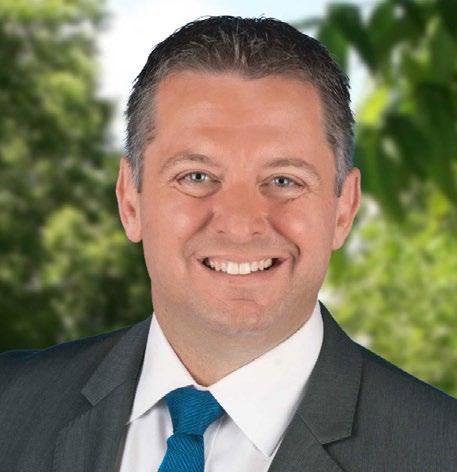
them with losing their house or losing everything, if they do lose and have costs awarded against them. Very poor attitude. Very poor approach to litigation on the part of defence. But nonetheless, it’s tactically abused. And we saw that in a federal court case just last year, where defence was smacked for that sort of behaviour. But now these people here, they have a firm behind them, which will take the fight up. And we’ve tried to find ways of underwriting their legal costs if we do happen to lose their case. So they’re not faced with the prospect of losing their house, just for trying to preserve their rights, trying to defend themselves against this defence machine. So, we’re out there actively finding people who can underwrite these cases. And we’re working with RSLs and other organizations, and hopefully, benefactors to come in and say, “look, we’ll help you with costs.” And that’s great if you win, and you get cost from defence. But, if you lose, we will underwrite the loss. So we’re taking on the machine, and I think it’s about time that, the machine was taken on and it’s having a good impact on our clients and their families, knowing that there’s a support mechanism behind them. GTR: Well, it would be tempting to say that Australia needs not only more people like you and the team at GAP, but GAP itself, in being able to assist in this area. Because of course it becomes a human rights issue and we are working with the human rights commission for this edition. So I do believe myself and I suppose, many others might also that there is an attachment to the understanding of human rights in regards to this. Because of course, with veterans, as we focus on veterans in this chat, there is a homelessness concerns. You just mentioned about losing homes in legal battles, or the potential for. We talk about homelessness. Unemployment obviously is a by-product. And then mental health too. So there are many layers to this. How do you get on top of that with your work? There must be so much there to address GK: You’re right. It’s a big picture. It’s a big piece. And I think, again, we’re pretty fortunate at GAP to have been able to break it down into its component pieces. And I’ll give you an example. We’re acting for a number of former, and serving ADF members now in some pretty sensitive matters. And we’ve been able to so provide their, wives and their families with family counselling services. So, mental health type support services, peripheral to the legal support we’re providing and peripheral to the employment support that GAP is providing to some of these veterans and their families. So it’s almost a one-stop shop for ex-defence members, veterans, and their families, who come upon hard times for whatever reason and need this whole of persons holistic support. And I think GAP is doing a pretty good job providing that service and from pretty humble beginnings as a human resources, employment type provider for veterans to providing this bigger support, a holistic support mechanism. It’s a good model. GTR: Yeah. One that we’re happy to have in Australia. I guess you spoke about has COVID, have lock downs and COVID affected the work itself. I mean, we all know face-to-face meetings are far better, or at least were, prior to COVID. We’ve come to accept and learn to work and live with Zoom, and meetings, team meetings, et cetera. But how do you think the veteran community is adapting to the zoom, as opposed to the face-to-face, or how is that working out for you? GK: Well, many of our clients, many of our cases are very sensitive matters. The defence and national security type matters. So we need face to face consultations, face to face meetings, take instructions face-to-face in a skiff type environment. So a Secure Information Facility type environment where we have no phones, we have phones secured away, and turned off. Where we have very tight controls on information in and out. It’s hard to do that via Zoom and Skype. And in fact, we can’t take proper instructions in many cases, by Zoom, or Skype, or Teams. So that could have an impact potentially, but because we’ve been in Canberra, to date, we haven’t had that issue. We’ve had, we’ve been able to take our instructions face-to-face in all cases, which has been very good. We’ll adapt, we’ll adapt to that. And we can work our way through that, and make ways of taking instructions, sensitive instructions without exposing their information and their clients to any risk. We’ll work through it. It’s got its challenges, but we’ll work through that. I think the face-to-face piece is important broadly anyway. I think part of the thing that our veterans and their families appreciate is the ability to come in and speak with us in a boardroom, or a relaxed boardroom environment, and not some stuffy legal office. Sit down with the team with myself and whoever else we’re working with on that particular job from GAP, and talk through things faceto-face, in a nice open relaxed, but yet very professional manner. Being able to cry, if necessary. Being able to shed a tear, or just stop and take a deep breath. And just get on and tell the story, and help us help them. That face-to- face is invaluable. So look, undoubtedly, the lock downs will have an impact and to date with us, they haven’t been fortunately, but potentially that they may. So we’ll work through that though, we’re pretty flexible. I’m working with the team now by Zoom, or by Teams, rather. GTR: So it’s important obviously to install in veterans that knowledge that they’re going to be amongst others who are colloquially on the same page, from the same background, potentially have the same experiences so that they do feel comfortable. And that’s a great thing when you’re dealing in such matters. So what would you say Glenn to the veterans listening to this, and indeed readings interview through the text version, what would you say to veterans who are considering approaching GAP. GK: Just be comfortable in the knowledge, as you quite correctly said Greg, comfortable in the knowledge that you’re dealing with people who have come from similar backgrounds. So we are veterans, one of the other directors is former air-force. Myself, of course. It’s very much a veteran centric organization still with that professional, non-military, so outside practice experience. But be comfortable in the knowledge that you’re going to be treated fairly, with us fully cognizant of the veterans backgrounds, and their family issues confronting their families, and themselves. Your information and your data is secure with us, obviously. We fully respect privacy, confidentiality. We’re not going to expose them to risk. And look, we work with them to take up their fights and address their issues as best within lawful bounds as best we can, and using our broad spectrum of tools. As you’re aware, we’ve used the media strategically in a number of occasions to advance our cases. When you’re taking on a big machine like defence, you need to use other strategic tools to advance the case. And we’ve done that very successfully on a number of occasions, and many other occasions, we haven’t done that. We’ve made the forensic decision not to, but using the media as a mechanism. Using the political processes as a mechanism. I’ve briefed senators and others to take up some of our cases on the floor of the Senate or the House, and advance our cases in that way. Let the government know, and let defence know that we’re watching them, and we know what they’re up to. And we want a fair, and equitable outcome for our clients, our veteran clients and their families. And if they won’t play by the rules, then we’ll use mechanisms to encourage them to play the game by the rules. GTR: Appropriate for many of Australians to know now that you are part of the GAP team, to assist veterans at their most vulnerable, perhaps. And we thank you so much for being part of this interview. And pod, we would suggest veterans get in contact with GAP. If need be, and that they can reach out and address that by viewing the website, and knowing that you are there to assist. GK: Thank you so much, Greg, it’s been a pleasure.


Catch Greg’s interview with Ben Wadham in our online podcasts. Ben is the Director of the Open Door: Veteran Transition, Integration, Wellbeing research initiative in the College of Education, Psychology, and Social Work.
Open Door is an Australasian research hub that brings together veterans, scholars, and practitioners together around key research, service provision, and policy/legislation initiatives. Open Door is connected to other veteran research hubs across the five-eye nations. Ben is the co-Deputy Director of Orama Research Institute for Mental Health and Wellbeing Abuse and Organisational Reform within the ADF (1969-). Ben is currently the lead CI on 2 grants investigating veteran transition and education. These studies explore how effective tertiary education is as a transition pathway, The second grant funded by the NCSEHE studies the ways universities understand veterans and govern their place in the university.

LOCKED DOWN AND SHUT OUT
The spate of lockdowns across Australia has limited our scope to move about. For many, we are legally restricted to only leaving home for essential purchases (food, drink, medical services). “Non-essential” businesses are closed, as too are museums and galleries. Not all of us with collections have them at home. For some they are on loan to a local institution, kept at our place of work or in offsite storage. In most instances, all of these options would mean that under lockdown conditions we are prevented from accessing or checking on the status of our collections. Sadly, damage (flood, fire, insects, hail, vandalism) and theft do occur, and frequently the impacts are greatest when there is a delay between the event and the damage or loss being discovered. In lockdown there’s not a lot we can do about this, but it makes collection management all the more important. When next you have the opportunity, take some steps to secure your collection to increase its safety and security.
Documentation
For insurance purposes, you want a good inventory of your collection. Documentation should include photographs clearly showing condition and all pertinent details that might be required should it ever be necessary to submit an insurance claim such as valuations, serial numbers, up to date lists of any modifications or pre-existing conditions which might impact on worth. Keep multiple copies of your documentation in more than one place so as to increase the likelihood that it will survive any adverse event. The busy day to day of life generally means that we often just pay whatever the incoming bill is on our insurance. Lockdown provides the perfect time for you to actually think about your collections and to have a discussion with your insurer, making sure that your coverage meets your collection’s needs.

Housekeeping
Store precious items off the floor so that any moisture ingress is less likely to cause corrosion, wood rot, staining or mold outbreaks. Store items under covers to prevent moisture from above. This may be Tyvek sheeting, polypropylene or polyethylene plastic sheeting or plastic tarpaulins, or storage in plastic tubs with lids. Good pest management with suitable pheromone traps and keeping collections well away from food sources like grain or stock feed. Wishing you and your collections safety during this challenging time.
ANDREW PEARCE


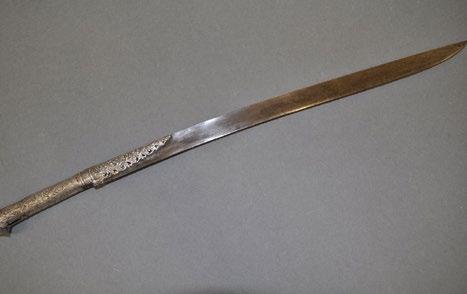
Last Post readers can write in with concerns or queries about the artefacts they have in their family collection. Letters will be answered by a qualified conservator from Endangered Heritage Pty Ltd. Endangered Heritage is a conservation business in Canberra, endorsed by the National RSL for conserving our military history. Both Victoria and Andrew Pearce have years of experience at the Australian War Memorial and with other military collections. Write in to LastPost@endangeredheritage.com to get a response in the following issue.
What the Australian government should do to help protect human rights in Afghanistan
The Australian government should urgently help protect Afghan civilians who are at heightened risk under the new Taliban authorities, Human Rights Watch said in a letter to Australia’s Prime Minister Scott Morrison. The government should also increase assistance for refugees and civil society groups, and support resolutions at the United Nations for ongoing monitoring and reporting of human rights violations in Afghanistan.
Safe passage and international protection for fleeing Afghans
We urge the Australian government to prioritize providing safe passage and travel documents for Afghans at heightened risk of persecution from the Taliban because of their past work or status, along with their immediate family members, whether inside or outside Afghanistan. Many in need of assistance are not at the Kabul airport, but may have already left the country, or are in the process of doing so, and may require documents and assistance in third countries. Civilians feared to be at particular risk include those who have worked to promote human rights, democracy, women’s rights, and education; academics, writers, journalists, and other media workers; and people who have worked for foreign countries; among other atrisk categories. Members of ethnic minorities and Shia Muslims, especially Hazaras, are also at greater risk. The Australian government should announce an urgent relocation and resettlement program for Afghans at high risk. This should be in addition to the regular annual humanitarian intake. So far, the Australian government has allocated 3,000 places to Afghan refugees within its existing annual humanitarian intake of 13,750 per year. This means Afghans get priority, but only at the expense of people fleeing other countries. Additional humanitarian intakes are possible – then-Prime Minister Tony Abbott offered 12,000 extra places to Syrians in 2015, during the height of the Syria crisis. There are at least 4,200 Afghans on temporary visas in Australia and 53 in detention who doubtlessly are terrified of being sent back to Afghanistan. The Immigration Minister has said “no Afghan visa holder currently in Australia will be asked to return to Afghanistan while the security situation there remains dire.” But the Australian government should immediately place a moratorium on all deportations and forced returns of Afghan nationals. In light of the fact that temporary visas are subject to applications for renewal, we urge the Australian government to create a pathway to permanent residency for all those on precarious temporary visas. Citizens of Afghanistan transferred to Papua New Guinea or Nauru should be relocated to Australia and also afforded international protection.
Humanitarian assistance and civil society support
We urge the Australian government to increase humanitarian assistance to neighboring countries to which Afghans are fleeing and support those countries admitting them. The Australian government should also pledge new support for nongovernmental groups inside and outside of Afghanistan that assist with refugee resettlement, and otherwise promote humanitarian and human rights needs, including for women, children, internally displaced people, and others, as well as education, health care, and other vital needs. The participation of Afghan civil society groups in discussions of assistance and resettlement is vital. The United Nations: strengthening reporting and fact-finding We urge the Australian government to support calls at the UN Human Rights Council in Geneva to create an international mechanism to collect and preserve evidence of violations and abuses by all parties to the conflict in Afghanistan and prepare files to facilitate fair and independent criminal proceedings, with the assistance of the UN High Commissioner for Human Rights. We ask the Australian government to call on the UN Security Council to immediately adopt a resolution demanding that all parties to the conflict in Afghanistan abide by international human rights standards and international humanitarian law, notably the humane treatment of civilians and combatants in custody. It should reiterate that the International Criminal Court, to which Afghanistan is a party, can prosecute war crimes and crimes against humanity. The resolution should call on the new authorities to ensure that everyone, including internally displaced people, have full and free access without discrimination to humanitarian assistance from UN agencies and humanitarian groups. The Security Council is set to renew the mandate of the UN Assistance Mission in Afghanistan (UNAMA) in September. UNAMA’s mandate should be expanded to explicitly include collecting information and evidence of serious violations and abuses. The council should instruct UNAMA to publicly report on its findings and share information and evidence with the Office of the Prosecutor of the International Criminal Court as well as other international or domestic bodies investigating war crimes and other abuses in Afghanistan.
ELAINE PEARSON
Elaine Pearson is the Australia Director at Human Rights Watch. Follow her on twitter @pearsonelaine.
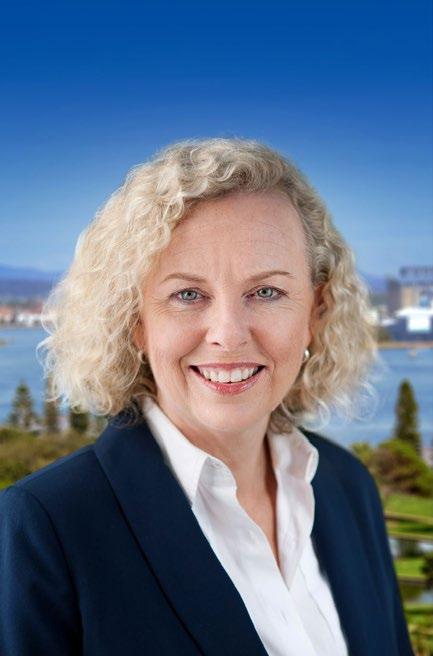
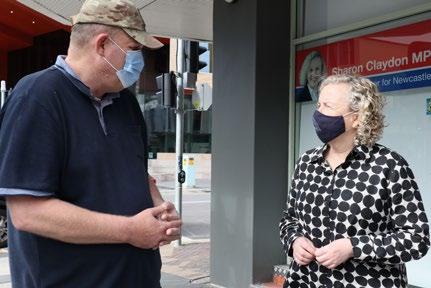
Veteran Pete Evans with Sharon Claydon MP.
A moral obligation
Like so many Australians, I have struggled to find the words to describe the situation unfolding in Afghanistan.
When I woke to news of the Taliban entering Kabul last week, it felt like I’d been punched in the stomach. I could not imagine how devastating it must feel for our Australian Defence Force personnel who served in Afghanistan or for the families who have lost someone they loved, to turn on their televisions and see it all unravelling. Over the past week, so many people including the local Afghani community in my electorate of Newcastle, have reached out to me to express their deep concern about the safety of their families and loved ones left behind. For our own veterans, the toll and moral injury they feel is especially shocking. The idea of leaving your mates behind is abhorrent to Australians soldiers. And not knowing if those who served alongside you, often wearing the same Australian uniform, are safe is devastating. Pete Evans, a veteran from my community, felt so strongly about the government’s failure to protect Afghan interpreters and their families that he took to burning his service medals as a final act of protest. I shared the stories of veterans Pete Evans and Stuart McCarthy in Parliament and presented their burnt service medals to the Prime Minister. For many months, veterans, former Prime Ministers and Labor have been pleading with the government for urgent action to bring the Afghan interpreters and their families back to safety. Time and time again, we heard lofty assurances that support was coming. But we also heard reports of interpreters and civilians being entangled in a bureaucratic nightmare, unable to leave Afghanistan without visas. At the time of writing, the government is now scrambling to do what it should have done months ago. News of rescue flights successfully landing in Kabul and returning safely back in Australia is welcome, but I fear for those still waiting on visas, that this may be too little, too late. These events could have been foreseen. Our allies in the US and UK began evacuating their Afghan supporters weeks ago. And here we are in Australia, pining our hopes on a last-minute, high-risk operation. It’s nowhere near good enough. The Afghani people who stood shoulder-to-shoulder with our troops deserve so much better. Australia has a moral obligation to provide safe haven for those Afghans who risked everything to support our mission. That’s what our veterans expect, it’s what the Australian people want, and it’s what the Morrison Government must deliver.
SHARON CLAYDON MP
Federal Member for Newcastle
Taking care of those who serve
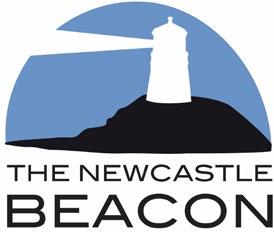
Between 2001 and 2016, 373 Australian veterans took their lives, and male veterans under 30 had a suicide rate more than twice the national average for men the same age.
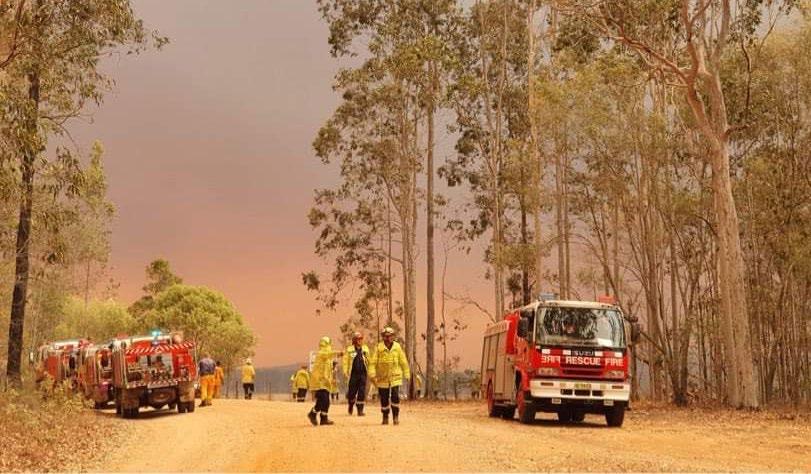
What’s more, the largest-ever survey of emergency workers released by Beyond Blue in November 2018 found that one in three emergency responders had high or very high psychological distress, and one in four former responders had probable post-traumatic stress disorder (PTSD). Navigating support services alone can be overwhelming for anyone in crisis. But for veterans and first responders there are several barriers to support such as fear of a lack of confidentiality, stigma, impact on service record or career progression, and being seen as the weak link in the team. To break down these barriers, and simplify the process of getting help, the Newcastle Beacon was established. It brings together a network of organisations, professionals and volunteers to support first responders, emergency department personnel, veterans and their families across Newcastle and the Hunter. “First responders are the ones sitting with people on the worst day of their lives and that can’t happen without a cost,” says Wendy Waldron, founder of the Newcastle Beacon, social worker and daughter of a veteran. “They’ve had our backs. And the Newcastle Beacon is about the community saying, ‘we’ve got your back now.’”
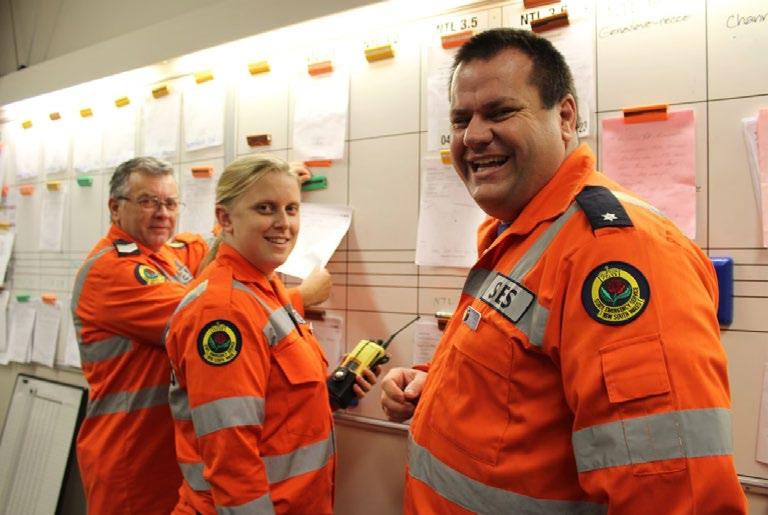
A specialised team of volunteers
Combining both peer and professional support services for veterans, first responders, and their families, the Newcastle Beacon’s team of specialised staff and The Newcastle Beacon’s drop-in centre is based upstairs in TPI House in Wallsend. Visit newcastlebeacon.org.au to find out more.
highly-trained volunteers include social workers, welfare officers and advocates, veterans, first responders and family members of those who serve or have served. “This combination of professional skills and lived experience enables us to understand and meet the needs of veterans and first responders with the right resources, knowledge, skills and compassion,” says Wendy. “The Newcastle Beacon is independent of government and employers and is unique to Newcastle and the Hunter. We have a strong understanding of local issues and through lived experience, we can offer support that’s solution-focused and based on the available resources in our region.”
Providing a safe space for the community
At the heart of the Newcastle Beacon is its drop-in centre in Wallsend. “We wanted to create a place for people and their families to connect with other veterans and first responders and access information on available resources as they relax and unwind in a safe space,” says Wendy. “We believe in giving back to those in crisis with the same dedication and commitment they’ve shown the community every day at work.”










